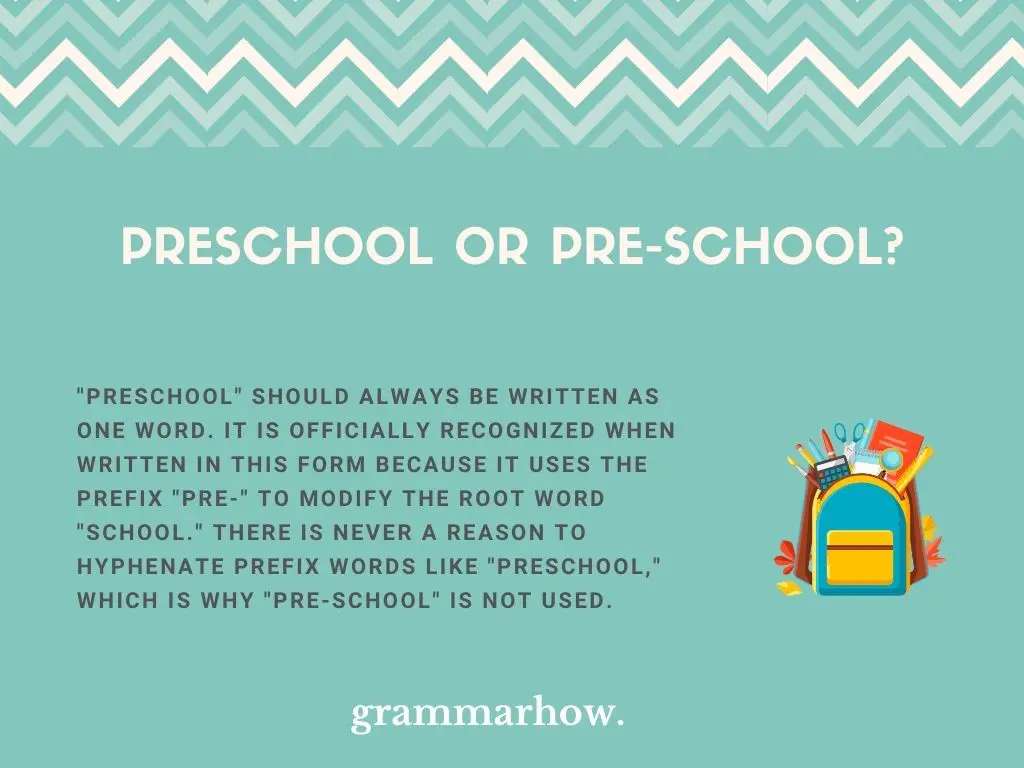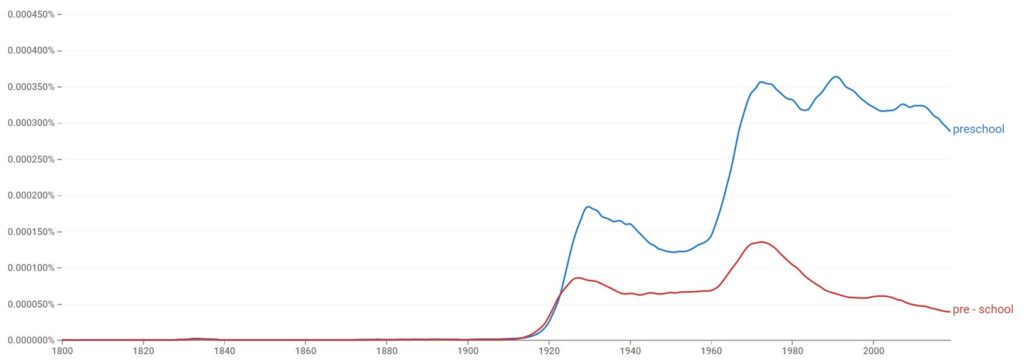When writing about “preschool,” we need to know how to spell it. You might think spelling it is the easy part, but some people write it in its hyphenated form (which isn’t necessarily correct). This article will look into whether it’s one or two words.
Preschool vs. Pre-school
“Preschool” should always be written as one word. It is officially recognized when written in this form because it uses the prefix “pre-” to modify the root word “school.” There is never a reason to hyphenate prefix words like “preschool,” which is why “pre-school” is not used.

According to Google Ngram Viewer, “preschool” is by far the most popular choice that many native speakers use in their writing. However, there are still some listed cases where “pre-school” is used.

While the graph does show that “pre-school” is used in some cases, that does not mean it’s correct. We only need to refer to some dictionaries to understand that it’s much better to group the words rather than hyphenate them.
In The Oxford Dictionary and The Cambridge Dictionary, only “preschool” is defined. This shows that both dictionaries value the one-word variation since “pre-” is a prefix, which means that no hyphen is required when it modifies the root word of “school.”
Preschool
“Preschool” is always correct. When working with prefixes in English, it can be common for people to mistakenly include hyphens when they’re unnecessary. This common trait is what leads to confusion about the hyphenated form, but “preschool” should never have a hyphen.
Here are some other “pre-” prefix words to help you understand more about it:
- Premeditated
- Predict
- Preview
- Prefix
- Precise
As you can see, none of the above forms are hyphenated. They simply use “pre-” to modify the root word that comes after them. The same applies when using “preschool.”
We use “pre-” to mean “before,” so “preschool” would apply when we’re looking to talk about the years that occur “before school.”
Here are a few examples that would be good for you to understand:
- I know of a few good preschool teachers who will be more than happy to help your son with his studies.
- Preschool is where it all starts! You’re about to begin your life now, and we can’t wait to see how you grow up.
- I didn’t enjoy my time at preschool! I enjoyed it when I got older because I missed all the things I used to do.
- If you don’t enjoy your first day at preschool, I’ll be sure to come in again and take you right out of it, okay?
Pre-school
We do not write “pre-school” as a hyphenated form. This is because “pre” is not an official word (it’s a prefix), so there is never going to be a reason where the formation of “pre school” appears in writing. Therefore, there is no reason to group them with a hyphen.
AP Stylebook guidelines teach us that when multiple words modify the same noun, they should be hyphenated to demonstrate the effect. For example, if “make” and “believe” are put together, we would turn it into “make-believe” as an adjective.
The same cannot be said for “preschool” since “pre” is not a word that you’d find in a sentence. We only need to look into some other “pre-” prefix words to see that hyphenated forms are not used (i.e. “pre-fix” is incorrect).
These examples should help clear things up:
- Correct: I’m not going to be able to take you to preschool today, sport. Are you going to be okay?
- Incorrect: If you’re not in pre-school by nine o’clock, the teachers are going to ask me what happened to you!
- Correct: I didn’t want to go back to preschool, but I knew it would make my mom happy.
- Incorrect: If pre-school was so bad, why did so many of the children enjoy their time there?
Is “School” Capitalized In The Word “Pre-School”?
Since we do not hyphenate “pre-school,” there is no reason to know more about the hyphenated form. Some people get confused about capitalization with hyphens, but it does not apply here.
Instead, you only need to worry about capitalizing “preschool” when it starts a sentence or is in a title. Any other time does not matter because it is not a proper noun.
